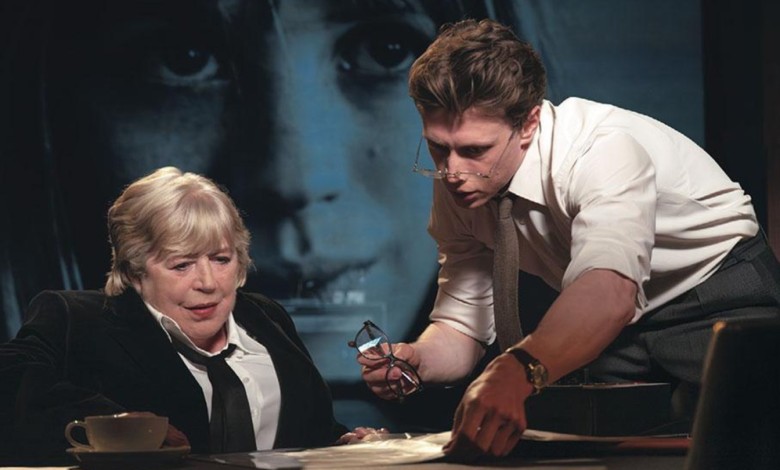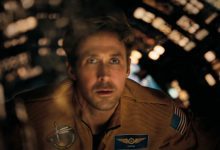George MacKay’s Venice Double Feature

George MacKay arrives in Venice with a problem most actors would fantasize about: two of his films are premiering on the Lido a mere 15 minutes apart.
Has this happened before? Probably. Will MacKay have to miss out? Not if he has anything to say about it. “I think there’s going to be a little bit of a logistical jump,” the British star tells The Hollywood Reporter. “A quick picture, and hope that [the other film] is next door. Hey,” he laughs, “It’s a good story to tell.”
In Venice, MacKay, best known for roles in Pride, 1917 and more recently, Joshua Oppenheimer’s The End, has Mark Jenkin’s competition feature Rose of Nevada with fellow countryman Callum Turner. The pair star as Nick and Liam, two fishermen who join up with a mysterious boat that has returned to a remote seaside village 30 years after it vanished.
After one voyage, they find themselves transported back in time, mistaken for the original crew. Shot on 16mm with all sound built in post-production, the final product is a surreal piece of work. “It’s liminal and poetic and simultaneously quite austere,” MacKay says about Rose of Nevada, a story steeped in the value of community. “For me, as an actor, I’m just fascinated by different processes of working.”
His second Venice-bound feature, Jane Pollard and Iain Forsyth’s Broken English, is a documentary-fiction hybrid project with Tilda Swinton. MacKay stars as a fictional record keeper for a place called The Ministry of Not Forgetting, tasked with illuminating the world of British singer-actress Marianne Faithfull. Faithfull features as herself in the doc, interviewed by MacKay’s character about her unbreakable life shaped by fame, fault and public scrutiny. It was shot before she died aged 78 in January this year.
“It’s a huge privilege to have been able to have that conversation and so intimately, really, and to be party to her and to these stories,” says MacKay about working with the late Faithfull, also Mick Jagger’s partner of four years. “They didn’t want to have a talking head interview, so they created a character who would do that job for them, who they could simultaneously direct as the interview was happening. And that’s what we did.”
Below, MacKay unpacks his Lido double feature. He discusses teaming up with fellow countryman Turner, surrendering to Pollard and Forsyth’s “Orwellian” setting and why film festivals are more important to the industry than ever: “It’s essential. It’s a wonderful coming together and championing of these works that otherwise don’t have the means to do it off their own back.”
***
Let’s start with Rose of Nevada, which subverted my expectations entirely. Did Mark approach you for it?
Yeah, Mark approached me. But he didn’t specify the character at the time. I was aware of Mark’s work. I hadn’t seen Enys Men yet, but I had seen Bait, and I loved Bait. I went to the cinema and was totally surprised… So I met Mark, I’ve got all my notes, I read the script — and I love the script because as you see in the film, it’s liminal and poetic and simultaneously quite austere — and I had all my theories on what it meant and what it was, who [the characters] were and why. Then I met Mark, and we didn’t talk about the film at all. We sat for an hour and a half and just talked about filmmaking and films that we loved and experiences.

George MacKay and Callum Turner in ‘Rose of Nevada’.
Venice Film Festival
Do you remember the specifics of that first conversation?
Mark’s way of filmmaking [and] so much of his films are about building a community. A huge part of it is getting to know each other as people. And then obviously, Mark’s filmmaking is so process-driven. We talked a lot about processes of work that we had enjoyed, films that we admired, the way [other] people have worked that we admire. Mark was very generous about a film that I did 12 years ago, called For Those in Peril, which is by a Scottish director, and it takes place in a fishing town. And he really loved that film. So we talked about that film quite a lot, the ethics of how films are made… That was kinda it. It was one of those conversations that we blinked and an hour-and-a-half had gone by, and he had somewhere to go, and I had somewhere to go, and that was that.
As you say, it is a very liminal and stylistic film. Surreal in parts. Did he talk about any of his inspirations for Rose of Nevada?
Not that I remember… I’d be loath to say something that then is not a reference that he mentioned. [Laughs.] I’m racking my brains, because there’s a French director — Callum always used to rib about it — that Mark really respects, and I’m forgetting. A prolific French director, and we watched one of his films before we started, which was insightful as to Mark’s styles and inspirations. But Mark is also so singular in how he likes to make films. So what was really interesting with this one is so much of the process of making the film was simply dictated by the kit. The Bolex camera, it only runs for 27 seconds unless you have an electric monitor on it. [Jenkin] said, ‘Well, I’m only going to film for the bits that I know I definitely need, and we’ll probably do one or two takes. And unless I have an electric monitor, if we run out of time, we’ll just pause, I’ll wind up the camera again, and start again.’ So it was just learning about the specificity of his way of working. Also, there’s no sound recorded on set, because the camera doesn’t record sound. So all the sound is done in post production. The ADR [additional dialogue recording], the music. Mark does a lot of the music himself as well.
That’s fascinating. So your lines were added in post?
Yeah. After the filming, when Mark’s picture locked the film, we went back down to Cornwall to a studio. There is a version of the film that has entirely just Mark’s voice on it, where he records all the dialogue as he’s editing, so that he has something to listen to as he watches, and then we come back, and we then fill in our lines.
Additional dialogue recording you do often, if a plane’s gone over or a car’s beeped outside the room where you’re filming. And they want the dialogue to sound clean, so you go in and lip sync it and try and match up. We basically did that with the [entire] film. I think, with Rosa of Nevada and his two films previously, and his short films, there is that slight removal of where the dialogue is coming from. It gives it a very certain and particular quality, it feels kind of old fashioned, because it’s how they would have done it back [then].
That 27 seconds on the Bolex camera — is that kind of experimental process liberating for you as an actor, or does it instil nerves because there’s a lot of pressure to get it right?
It’s kind of like going on stage, in a way. I don’t know. I feel like for me, as an actor, I’m just fascinated by different processes of working… I think the process is led by either director or the nature of what you’re making. And maybe if that’s TV, that’s working quickly, because you’ve got to film so much material. If you’re on stage, you’ve got to work on your voice. And then then within film, different directors will want to, if they’re playing with digital, improvise and just make as much footage as possible, whereas this was a lesson in accuracy and aiming at the target all the time. It narrows things somewhat, because you’re always thinking [before a take]: ‘This is my most accurate choice, my least indulgent choice.’
You mention some of the notes and theories you came to Mark with after reading the script. Without giving too much away, how do you see Nick’s story and where the film ends up?
I literally just WhatsApp-ed Mark five minutes ago. [Laughs.] I just want to make sure that I’m not going to give away the ending. It’s beautiful that it’s up for interpretation, and Mark is reticent to give any definitive answer. I’d say it’s about community, and in a very liminal way, exploring the value of being there for other people.
Had you met Callum before this? You kind of feel of the same… brand of actor?
[Laughs.] The same generation?
Yes!
Yeah. I’d met Cal to say hello, I met him in the queue for tickets at a theater. I was really, really excited when I heard that Callum was going to be doing this. I just really respect the work that he’s doing, the choices that he’s making, how he approaches his work. As soon as I heard that Cal was doing it, I was like, “Oh, wow, okay, cool.” Cal’s on a really particuar run, I think. He’s one of those actors that I’m intrigued about, if Cal’s put his name to it. I’m excited by Callum’s choices. And it turns out he’s a lovely man. So yeah, it was all good news and we had a good time doing it.
In Broken English, we have a hybrid fiction/non-fiction documentary about Marianne Faithfull. How was this project pitched to you?
I’ve worked with Ian and Jane, the directors, a number of times before. I’ve done two artistic projects with them… They’re just dear, dear friends. I have a deep respect for the work that they do, and so anything that they want to do, I want to be there with them. And at the stage that I got involved, it was actually a few years ago that when I first did my bit, because they only had a small amount of funding at the time and they wanted to prioritize working with Marianne, who’s sadly no longer with us. But she was getting older. They just explained that they had this concept, this Orwellian place called the The Ministry of Not Forgetting, and I would be a record keeper within that, and they would use my character to generate the interviews that would become the backbone of the story. And that was all we had at the time. So, based upon the archive that they knew that they wanted to get Marianne to talk about, we scripted a framework of interviews to go on. But I would also have an earpiece in my ear and would talk to Marianne in character and be fed information as to: “Okay, push on that point,” or “Okay, now move to the next bit of archive.” It was kind of a live exercise.
It was kind of like improv for you. You were interviewing her.
Yeah. It’s an improv interview with a real person, via a character. Very simply, they didn’t want to have a talking head interview, so they created a character who would do that job for them, who they could simultaneously direct as the interview was happening. And that’s what we did.
Had you worked with Tilda before?
It’s funny — I knew about The End, but the financing wasn’t there yet, so I hadn’t filmed The End yet, a film I did with Tilda that came out last year. I did The End after [Broken English], but that ended up coming out before this documentary. It’s funny how it all kind of shakes down.
It must be strange, but at the same time such a touching honor, that you are one of the last people to have an on-camera interaction with Marianne. Have you been thinking about that since her death?
I had the same thing with [David] Bowie, where I didn’t realize how many songs were Bowie. And because Marianne went through such a journey of identity as an artist, even vocally, I wasn’t aware of her songs that I knew. So I came to appreciate her so much more when I became part of this and was doing the research to participate.
It’s a huge privilege to have been able to have that conversation and so intimately, really, and to be party to her and to these stories. We structured the framework of where we hoped the conversation may go, and then, of course, they go in completely different directions all the time. So it was a totally live thing. It’s always a pleasure to speak to a great mind. You [can] ask these questions [and it’s] almost easier to talk about in this setting because people might be reticent to speak about it day to day, or if you met them in a cafe or something. Especially because of my character and his enthusiasm, it was really lovely to be unashamed [and] just go straight in on everything with her. It was a real privilege.
Have you been to Venice Film Festival before?
No! There was a film that came out two years ago called The Beast but it was during the [SAG-AFTRA] strikes so I elected not to attend. So I’ve had a film there, but I’m very excited to go and be there in person.
Twice! Are the premieres close together?
They are actually at the same time on the same day. I think there’s going to be a little but of a logistical jump. [Laughs.] A quick picture and hope that they’re next door.
You can’t choose one over the other.
Oh, no. I think they’re staggered by 15 minutes, so I can go and show my face for both.
What are the chances?
I know. It’s mad, isn’t it? Hey, it’s a good story to tell.
Are you excited to set foot on the lido?
I’m really excited. I’m really excited by the films of recent years, particularly that have come out of Venice. There’s such a romance to the city and that festival. I’m so thrilled that both films are premiering there. It feels like a really good fit for them somehow, as well, the artistic nature of the festival and the artistic nature of the films, I think it’s a really good launch pad and home for them.
You’re really right — Rose of Nevada and Broken English are experimental in lots of ways. And it feels like Venice is such a champion for those voices. Do you think these fests are important to the film industry?
Massively. On a logistical and financial point, these are more experimental visions and stories and there are safe bets [in film] which are totally valid, safe bets because they are massively enjoyable. But in terms of breaking new ground, the people who finance these films don’t often have the money to go beyond the making of the film. So it’s these festivals, and the fact that there are so many eyes and professionals there who can spread the word and champion these films and give them a platform that then other powers can come in and shout them from the rooftops. It’s essential. It’s a wonderful coming together and championing of these works that otherwise don’t have the means to do it off their own back, necessarily.
Thank you for your time, George!
I really appreciate you speaking about these films and the nature with which they were made. They were made with such love and commitment to the process, they were very true to themselves and I always think that’s kind of the only way to make something with integrity, is to have it be true to itself. But they don’t often get the mouthpiece that publications like yours can give them — so thank you.
Source: Hollywoodreporter
HiCelebNews online magazine publishes interesting content every day in the movies section of the entertainment category. Follow us to read the latest news.
Related Posts
- 'At Work'
Christine Tamalet/Venice Film Festival
Share on Facebook…
- Box Office: ‘KPop Demon Hunters’ Sings to Estimated $17M-$18M in First Theatrical Win for Netflix
- Sabrina Carpenter Releases “Tears” Music Video Starring Colman Domingo in Drag
- Quinta Brunson and ‘Abbott Elementary’ Cast Film Season 5 Episode During Phillies Game
- ‘Dexter: Resurrection’ Victim Says the Door’s Open for a Comeback: “Never Say Never”





